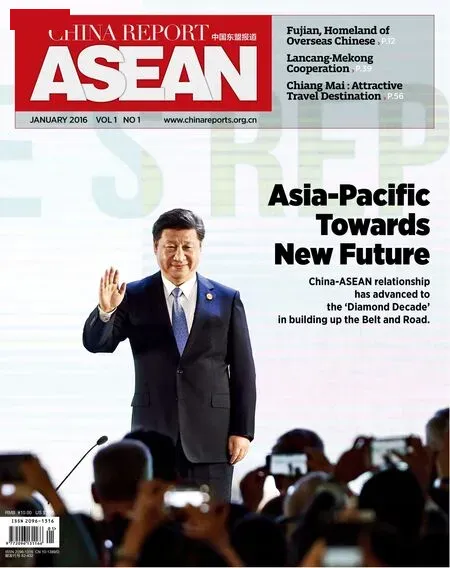BRIEF NEWS
Editor | Xia Hailin
BRIEF NEWS
Editor | Xia Hailin
Premier Li Keqiang Visited Malaysia
From Nov 20 to 23, 2015, Chinese Premier Li Keqiang paid his first official visit to Malaysia since taking office in March 2013.
During the visit, he interacted with his Malaysian host, Prime Minister Najib Razak and visited the historic city of Malacca. In Kuala Lumpur, he attended the 18th China-ASEAN (10+1) leaders' meeting, the 18th ASEAN-China, Japan and South Korea (10+3) leaders' meeting and the 10th East Asia Summit.
At the 10+1 leaders' meeting,Li made a six-pronged proposal on China-ASEAN cooperation. He urged China and ASEAN nations to strengthen institution building by implementing their new five-year action plan and the 2+7 cooperation framework. He also called on China and ASEAN to speed up the implementation of the results of the negotiations on an upgrade of their Free Trade Agreement (FTA), and make concerted efforts to conclude as early as possible the negotiations for the Regional Comprehensive Economic Partnership (RCEP).
Premier Li and other ASEAN leaders attended the signing ceremony of a protocol on deepened cooperation on bilateral trade, a supplement to the original agreement of the ASEAN-China Free Trade Area (ACFTA), which covers a wide range such as trade in goods,services, investment, economic and technological cooperation.
At the 10+3 leaders' meeting, Li said the resumption of the leaders' meeting between China, Japan and South Korea and the upcoming ASEAN Economic Community will unleash fresh momentum for the development of the 10+3 mechanism. He proposed acceleration of economic integration of East Asia.
Li also called for concerted efforts to safeguard financial stability of the region and raise the level of interconnectivity, noting that China has been accelerating the construction of a maritime cooperation platform in East Asia so as to boost cooperation in maritime inter-connectivity,research and personnel training.
At the East Asia Summit,Premier Li called on East Asian nations to safeguard the regional financial stability with concerted efforts by enhancing the macroeconomic policy coordination and communication between their financial institutions. He urged a higher level of inter-connectivity in the region and international production capacity cooperation with a focus on areas including major infrastructure construction projects,engineering machinery, power and building materials. Meanwhile, he stressed that such cooperation should be based on self-willingness,equality terms and mutual benefits. during the latter's visit to China in June. Xi indicated that China hoped that the project will become "an exemplary one" in China's Belt and Road Initiative.
China, Singapore Held Annual Cooperation Meetings
In mid-October 2015, China and Singapore held three annual meetings of bilateral cooperation in Singapore. Chinese Vice Premier Zhang Gaoli and Singapore Deputy Prime Minister Teo Chee Hean co-chaired the 12th meeting of China-Singapore Joint Council for Bilateral Cooperation, the 17th China-Singapore Joint Steering Council Meeting for the Suzhou Industrial Park and the eighth China-Singapore Joint Steering Council Meeting for the Tianjin Eco-city.
The topics of the meetings included the existing Suzhou and Tianjin projects, the upgrading of bilateral free trade agreement,financial cooperation, cultural and people-to-people exchanges as well as sustainable development. Both sides pledged to deepen cooperation in intergovernmental projects so as to forge ahead bilateral ties of mutual benefit.
A third intergovernmental project focusing on connectivity, modern logistics and finance in western China,was also discussed at the meetings. The project was earlier discussed by Chinese President Xi Jinping with his Singaporean counterpart Tony Tan
Forum on Maritime Silk Road Initiative Held in Cambodia
A forum on China-initiated 21st Century Maritime Silk Road was held in Phnom Penh on Oct 27, 2015, aiming at promoting the initiative to Cambodian officials, entrepreneurs, economists and researchers. Chinese Ambassador to Cambodia Ms. Bu Jianguo and Cambodian Minister of Commerce Mr. Sun Chanthol were among the 200 participants at the forum.
Ambassador Bu said under the Maritime Silk Road initiative,cooperation between China and Cambodia, particularly in infrastructure development,economics, trade, investment,tourism and culture, will be broader.
Meanwhile, Minister Sun Chanthol said Cambodia fully supported the initiative since it would contribute to socio-economic development and poverty reduction.
‘Annual Report on the Development of ASEANChina Cooperation 2014-2015' Released
On Sept 16, 2015, the “Annual Report on the Development of ASEAN-China Cooperation 2014-2015” was released in Nanning.
The Report is the fruition of research conducted by CARI of Guangxi University and the Collaborative Innovation Centre for China-ASEAN Regional Development. It comprises the general report on review and outlook of 2014 China-ASEAN cooperation in 2014 and 2015 and series of reviews of the cooperation in a wide range of areas such as politics, economy, diplomacy,security, society and culture, and etc. The Book is only in Chinese language and aimed at raising awareness about ASEAN and ASEAN-China relations among the Chinese general public.
Source:
Xinhua
China News Service China Daily
ACC

